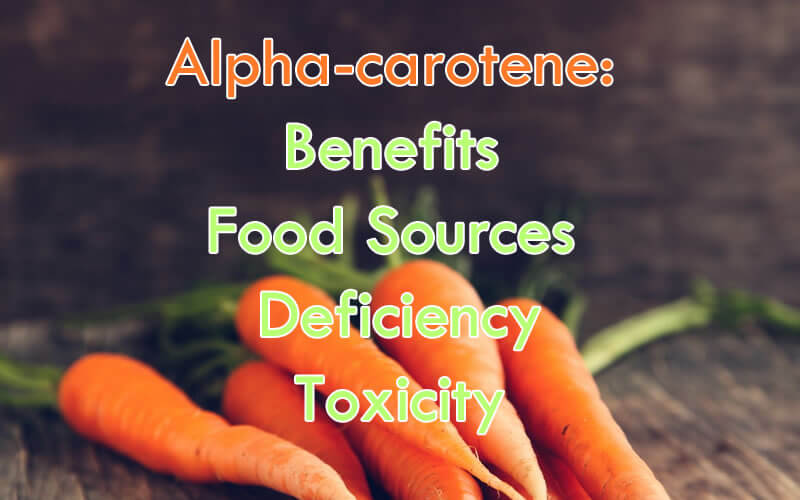Alpha-carotene: Benefits, Food Sources, Deficiency, Toxicity, and More
What is alpha-carotene?
Alpha-carotene (α-carotene) is a type of carotenoid, which is a class of naturally occurring pigments found in many fruits and vegetables. It is a provitamin A compound, one of approximately 50 carotenoids able to be converted in the body into retinol, an active form of vitamin A. Alpha-carotene has approximately one-half of the vitamin A activity of beta-carotene.
What can foods rich in alpha-carotene do for you?
- Protect your cells from the damaging effects of free radicals.
- Provide a source of vitamin A.
- Enhance the functioning of your immune system.
- Help your reproductive system function properly.

What are the functions of alpha-carotene?
Preventing Vitamin A Deficiency
Until late in the 20th century, the functions of carotenoids, including alpha-carotene, were discussed only in terms of their potential vitamin A activity. Alpha-carotene is one of approximately 50 carotenoids of the known 600 that are called "provitamin A" compounds because the body can convert them into retinol, an active form of vitamin A. (more about vitamin A deficiency symptoms)
As a result, foods that contain alpha-carotene can help prevent vitamin A deficiency. In addition to beta-carotene and beta-cryptoxanthin, alpha-carotene is among the most commonly consumed provitamin A carotenoids in the North American diet.
Antioxidant & Immune-Enhancing Activity
In recent years, carotenoids, including alpha-carotene, have received a tremendous amount of attention as potential anti-cancer and anti-aging compounds. Alpha-carotene is a powerful antioxidant, protecting the cells of the body from damage caused by free radicals.
Promoting Proper Cell Communication
In addition to their antioxidant and immune-enhancing activity, carotenoids including alpha-carotene, have shown the ability to stimulate cell-to-cell communication. Researchers now believe that poor communication between cells may be one of the causes of the overgrowth of cells, a condition that eventually leads to cancer. By promoting proper communication between cells, carotenoids may play a role in cancer prevention.
What are the deficiency symptoms of alpha-carotene?
A low dietary intake of carotenoids such as alpha-carotene is not known to directly cause any diseases or health conditions, at least in the short term. However, if your intake of vitamin A is also low, a dietary deficiency of alpha-carotene and/or other provitamin A carotenoids can cause the symptoms associated with vitamin A deficiency.
In addition, long-term inadequate intake of carotenoids is associated with chronic diseases, including heart disease and various cancers. One important mechanism for this carotenoid-disease relationship appears to be free radicals. Research indicates that diets low in alpha-carotene and carotenoids can increase the body's susceptibility to damage from free radicals. As a result, over the long term, alpha-carotene-deficient diets may increase tissue damage from free radical activity and increase the risk of chronic diseases like heart disease and cancer.
What factors might contribute to a deficiency of alpha-carotene?
Carotenoids such as alpha-carotene are fat-soluble substances and, as such, require the presence of dietary fat for proper absorption through the digestive tract. Consequently, your alpha-carotene status may be impaired by a diet that is extremely low in fat or if you have a medical condition that causes a reduction in the ability to absorb dietary fat, such as pancreatic enzyme deficiency, Crohn's disease, celiac sprue, cystic fibrosis, surgical removal of part or all of the stomach, gall bladder disease, or liver disease.
Due to low consumption of fruits and vegetables, many adolescents and young adults do not take in enough carotenoids. In addition, if you smoke cigarettes and/or drink alcohol, you may have lower than normal blood levels of alpha-carotene. Statistically speaking, smokers and drinkers eat fewer foods that contain carotenoids such as alpha-carotene. Also, researchers suspect that cigarette smoke destroys carotenoids. However, if you do smoke or drink, use carotenoid supplements with caution.
What are the toxicity symptoms of alpha-carotene?
A high intake of carotenoid-containing foods or supplements is not associated with any toxic side effects. As a result, the Institute of Medicine at the National Academy of Sciences did not establish a tolerable upper intake level (UL) for carotenoids when it reviewed these compounds in 2000.
Health benefits of carotenoid
A diet rich in carotenoid-containing foods may play a role in the prevention of the following health conditions:
- Acquired Immunodeficiency Syndrome (AIDS)
- Age-related macular degeneration
- Angina pectoris
- Asthma
- Cataracts
- Cervical cancer
- Cervical dysplasia
- Chlamydial infection
- Heart disease
- Laryngeal cancer (cancer of the larynx)
- Lung cancer
- Male and female infertility
- Osteoarthritis
- Photosensitivity
- Pneumonia
- Prostate cancer
- Rheumatoid arthritis
- Skin cancer
- Vaginal candidiasis
What events and lifestyle factors can indicate a need for more foods that are rich in alpha-carotene?
- Smoking and regular alcohol consumption
- Low intake of fruits and vegetables
Food sources of alpha-carotene
The following vegetables are rich in alpha-carotene:
Yellow-orange vegetables: carrots, sweet potatoes, pumpkin, winter squash
Dark-green vegetables: broccoli, green beans, green peas, spinach, turnip greens, collards, leaf lettuce, avocado
Below are the top 10 foods highest in alpha-carotene (per 100g):
| Foods | Amount |
| Carrots | 3776 mcg |
| Pumpkin | 2715 mcg |
| Butternut Squash | 1130 mcg |
| Tangerines | 101 mcg |
| Tomatoes | 101 mcg |
| Collard Greens | 68 mcg |
| Napa Cabbage | 49 mcg |
| Sweet Potato | 43 mcg |
| Bananas | 25 mcg |
| Avocados | 24 mcg |
Consuming a diet rich in a variety of fruits and vegetables that contain alpha-carotene, along with other carotenoids, can contribute to better health and reduce the risk of various health issues. It's important to maintain a balanced and diverse diet to ensure that you receive a wide range of nutrients.